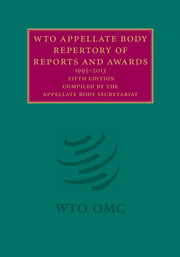Book contents
- Frontmatter
- Contents (outline)
- Contents
- Foreword to the 1995–2013 edition
- List of Abbreviations for Parts I and II
- Part I Appellate Body Reports
- A
- B
- C
- D
- E
- F
- G
- H
- I
- J
- L
- M
- N
- O
- P
- Q
- R
- S
- T
- V
- W
- PART II Arbitration Awards under Article 21.3(c) of the DSU
- Annexes
- Abbreviations used in the Table of References to the Covered Agreements and Other Instruments and in the Indexes
- Table of References to the Covered Agreements and Other Instruments by Article
- Subject Index
- Subject Index by Case (Appellate Body Reports)
- Subject Index by Case (Arbitration Awards under Article 21.3(c) of the DSU)
N
from Part I - Appellate Body Reports
Published online by Cambridge University Press: 05 March 2015
- Frontmatter
- Contents (outline)
- Contents
- Foreword to the 1995–2013 edition
- List of Abbreviations for Parts I and II
- Part I Appellate Body Reports
- A
- B
- C
- D
- E
- F
- G
- H
- I
- J
- L
- M
- N
- O
- P
- Q
- R
- S
- T
- V
- W
- PART II Arbitration Awards under Article 21.3(c) of the DSU
- Annexes
- Abbreviations used in the Table of References to the Covered Agreements and Other Instruments and in the Indexes
- Table of References to the Covered Agreements and Other Instruments by Article
- Subject Index
- Subject Index by Case (Appellate Body Reports)
- Subject Index by Case (Arbitration Awards under Article 21.3(c) of the DSU)
Summary
National Treatment
N.1.1 Article III:1 of the GATT 1994 – General principle
N.1.1.1 Japan – Alcoholic Beverages II, pp. 16–17, DSR 1996:I, 97, at 109–110
(WT/DS8/AB/R, WT/DS10/AB/R, WT/DS11/AB/R)
The broad and fundamental purpose of Article III is to avoid protectionism in the application of internal tax and regulatory measures. More specifically, the purpose of Article III “is to ensure that internal measures ‘not be applied to imported or domestic products so as to afford protection to domestic production’”. Toward this end, Article III obliges Members of the WTO to provide equality of competitive conditions for imported products in relation to domestic products.… It is irrelevant that “the trade effects” of the tax differential between imported and domestic products, as reflected in the volumes of imports, are insignificant or even Non-existent; Article III protects expectations not of any particular trade volume but rather of the equal competitive relationship between imported and domestic products. …
… The Article III national treatment obligation is a general prohibition on the use of internal taxes and other internal regulatory measures so as to afford protection to domestic production. This obligation clearly extends also to products not bound under Article II. …
N.1.1.2 Japan – Alcoholic Beverages II, p. 18, DSR 1996:I, 97, at 111
(WT/DS8/AB/R, WT/DS10/AB/R, WT/DS11/AB/R)
… Article III:1 articulates a general principle that internal measures should not be applied so as to afford protection to domestic production. This general principle informs the rest of Article III. The purpose of Article III:1 is to establish this general principle as a guide to understanding and interpreting the Specific obligations contained in Article III:2 and in the other paragraphs of Article III, while respecting, and not diminishing in any way, the meaning of the words actually used in the texts of those other paragraphs. In short, Article III:1 constitutes part of the context of Article III:2, in the same way that it constitutes part of the context of each of the other paragraphs in Article III.
- Type
- Chapter
- Information
- WTO Appellate Body Repertory of Reports and Awards1995–2013, pp. 678 - 729Publisher: Cambridge University PressPrint publication year: 2014
- 1
- Cited by



